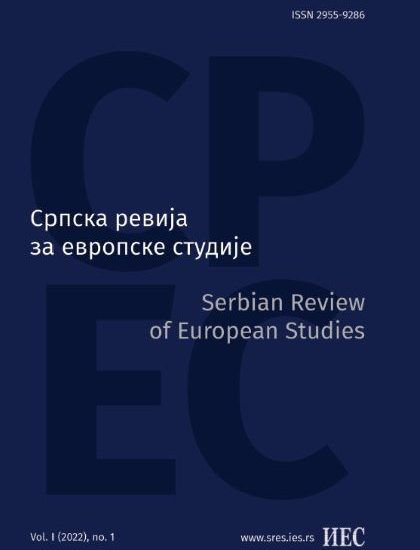A NOTE BY THE EDITOR
Serbian Review of European Studies (SRES) is an interdisciplinary, peer reviewed journal of the Institute of European Studies (IES) in Belgrade.
The main goal of the SRES is to publish scientific papers on the topic of European studies, thus reflecting the long-term research orientation of the Institute of European Studies. The SRES also aims to promote debate and provide a venue for empirical and theoretical analysis on European integration.
SRES covers a wide range of topics that contribute to a deeper understanding of the European integration process. We welcome submissions from a variety of disciplinary or multidisciplinary perspectives, ranging from political science, law, sociology to public administration, political economy, media studies and cultural studies. The journal is published three times per year in Serbian and English languages.
It is open for quality articles in the following categories: original/research and review papers, book reviews, critiques and notes of scientific interest. All contributions will undergo peer-review before being accepted for publication.
Serbian Review of European Studies addresses various aspects of European integration. We invite new empirical and theoretical research that considers the democratic legitimacy of the integration process, the dynamic nature of the European Union, the evolution, functioning, and impacts of EU institutions and policies, the EU’s role as a global actor, the EU membership negotiation process with the focus on the experience of the Republic of Serbia, and other topics.
In particular papers are invited on any of the following thematic areas:
– European Integration in times of crisis;
– Current changes in the processes of European Integration;
– Important aspects of organizing and functioning of the European Union (EU’s political and legal system);
– Public policies of the European Union (i.e., economic and monetary union, or foreign and security policy);
– Historical and current transition processes in Central, Eastern and South-Eastern Europe;
– Narratives of European Integration;
– The current problems related to fundamental rights, the rule of law and democracy in the European Union;
– European integration and globalization;
– Digital transformation in the European Union;
– The impact of new and legacy media on the formation of political membership;
– Issues of regional development and cultural identities.
With hope that by joint efforts we will overcome the blank spaces in academic publishing in European studies in Serbia and the neighborhood, and that we will give a meaningful contribution to the development of the discipline on a wider scale, we ask you to join our research and publishing endeavour, in the team of SRES authors and reviewers.
Editor-in-Chief
Milan Igrutinović
